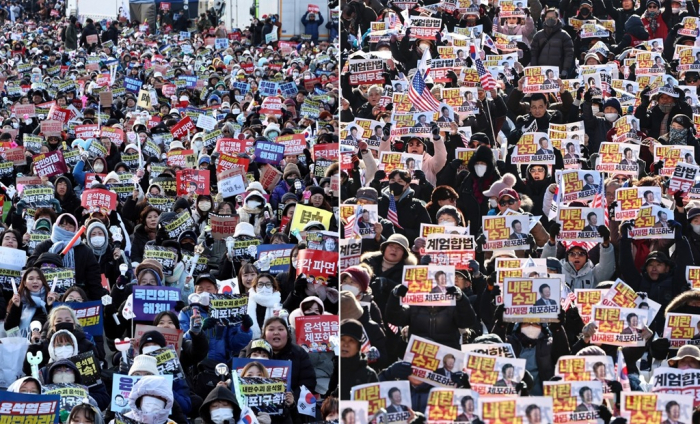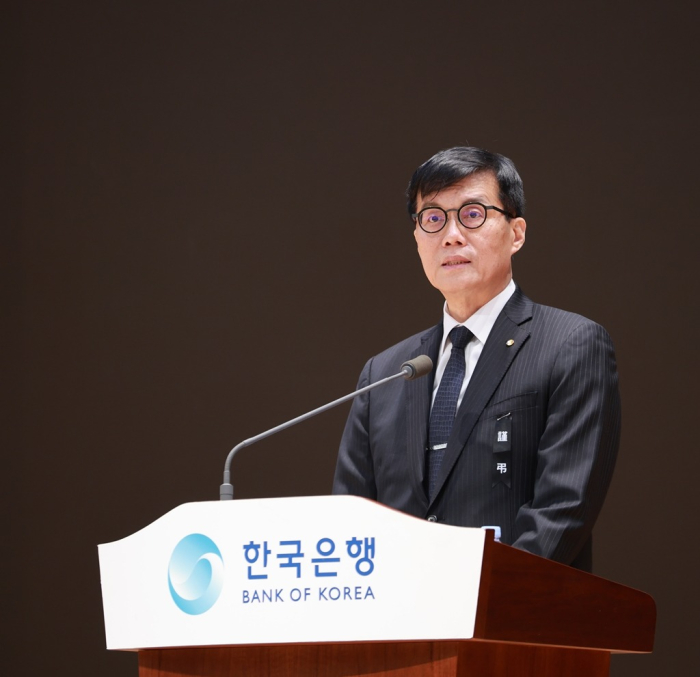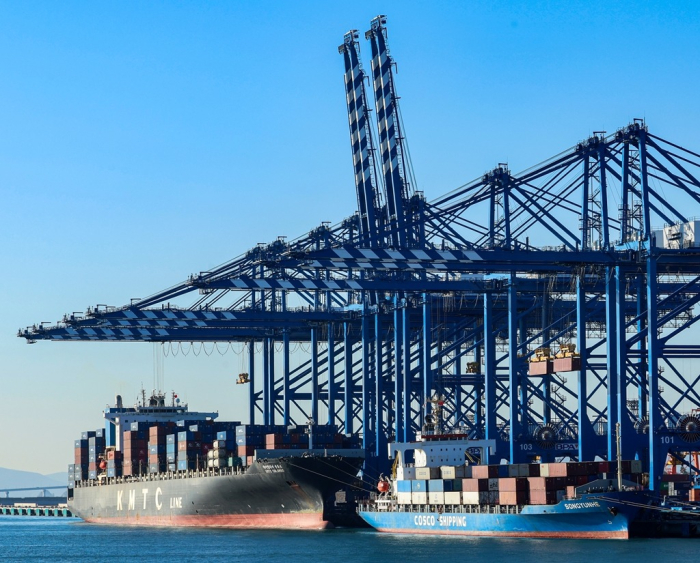Korea sharply cuts 2025 growth forecast, opens door for extra budget
Government bond yields fall across the board with the three-year yield at its lowest since March 2022 as the BOK is also expected to cut rates
By Jan 02, 2025 (Gmt+09:00)
LG Chem to sell water filter business to Glenwood PE for $692 million


Kyobo Life poised to buy Japan’s SBI Group-owned savings bank


KT&G eyes overseas M&A after rejecting activist fund's offer


StockX in merger talks with Naver’s online reseller Kream


Mirae Asset to be named Korea Post’s core real estate fund operator



South Korea sharply lowered its economic growth forecast for this year amid the prolonged political turmoil following President Yoon Suk Yeol’s martial law decree, opening the door for extra spending to revive Asia’s fourth-largest economy.
The Ministry of Economy and Finance said on Thursday that it expected the economy to expand 1.8% this year, much lower than its earlier forecast of 2.2% in July 2024. The economy was estimated to have grown 2.1% last year, compared to its earlier projection of 2.2%, the ministry said.
“Downside risks to the economy increased as uncertainties at home and abroad grew,” the ministry said in its 2025 Economic Policy Directions report. “If necessary, the government will seek additional economic reinforcement measures after reviewing overall economic conditions in the first quarter.”
South Korea's opposition-controlled National Assembly last month passed a government budget bill for 2025, slashed from the government's proposal amid resistance from the ruling People Power Party.
The political crisis following Yoon’s stunning declaration of martial law on Dec. 3 is expected to put further pressure on the export-reliant economy, which had already been predicted to suffer from US President-elect Donald Trump’s trade protectionism.
Both Yoon and Acting President and Prime Minister Han Duck-soo were impeached last month, making Minister of Economy and Finance Choi Sang-mok the interim leader. Yoon, who faces an unprecedented arrest over the short-lived martial law, reiterated that he would “fight until the end.”
The ministry is likely to cut its growth forecast further if the political turbulence lingers.
“The (latest) forecasts were made based on assumptions that uncertainties from the martial law and impeachment are managed to some extent,” First Vice Minister of Economy and Finance Kim Beomseok said at a briefing.
BOK TO CUT INTEREST RATES
South Korean government bond yields fell across the board after the grim prognosis.
The highly liquid South Korean government’s three-year bond yield slid 8.9 basis points (bps) to 2.507%, the lowest since March 2022, while the five-year debt yield lost 8.1 bps to 2.681%, according to the Korea Financial Investment Association. The 10-year yield skidded 10.6 bps to 2.749%.
Bank of Korea (BOK) Governor Rhee Chang-yong vowed to take a flexible approach to future interest rate cuts while closely monitoring risks in the face of increased political and economic uncertainties in a New Year’s speech after the finance ministry delivered its gloomy outlook.

The central bank, which expected the economy to grow 1.9% this year before the martial law decree, was predicted to cut interest rates to prop up the economy, analysts said.
“A sizable supplementary fiscal budget is expected to be announced to revive markedly diminished domestic growth, and monetary policy is expected to follow suit with faster rate cuts than we had expected,” ING said in a note.
ING said it continues to believe the BOK will lower by a total of 100 bps this year but the current situation will likely accelerate the pace of cuts, adding it expects a 25 bps cut in both January and February.
The investment bank downgraded its growth forecast for the South Korean economy to 1.4% from its earlier 1.6%.
SLOWER EXPORT GROWTH
The finance ministry expected slower export growth to drag down overall economic growth this year.
Overseas shipments were forecast to rise only 1.5% in 2025, far lower than the 8.2% growth last year, the ministry said.
“Export growth is projected to slow due to the intensifying competition in key industries such as semiconductors and increasing downside factors including the shift in US trade policy,” it said.
South Korea pledged to provide the largest-ever trade finance of 360 trillion won ($245.4 billion) to deal with weaker exports. The country also plans to cut lending rates for ailing exporters in the first half.

US President-elect Donald Trump, who takes office on Jan. 20, has threatened to impose sweeping tariffs and review generous subsidies for companies investing in the US, including those for the country’s allies and largest trading partners such as South Korea.
The Asian country aims to establish channels of cooperation with the new US administration while seeking to expand mutual benefits between the two nations, the finance ministry said.
TO ATTRACT FOREIGN INVESTMENT
South Korea is set to offer more incentives to increase foreign investment amid the political turmoil.
The finance ministry said it plans to raise the limit on cash subsidies for foreign investment by 5-20 percentage points for each sector. In 2025, the ministry is poised to additionally ramp up the limit by 10-25 percentage points.
The country, which set aside 200 billion won for the subsidies, aims to spend as much of the budget as possible in the first half.
The government has also prepared tax incentives for foreign investment. The country plans to reduce tariffs, excise and value-added taxes on capital goods imported for foreign investment for up to seven years, instead of the previous six years.
Write to Kyung-Min Kang, Se-Min Huh and Kwang-Sik Lee at kkm1026@hankyung.com
Jongwoo Cheon edited this article.
-
 EconomyKorea’s 2024 exports hit all-time high, driven by chips, shipments to China
EconomyKorea’s 2024 exports hit all-time high, driven by chips, shipments to ChinaJan 02, 2025 (Gmt+09:00)
2 Min read -
 Business & PoliticsKorea’s new acting president assures economy resilient, security tight
Business & PoliticsKorea’s new acting president assures economy resilient, security tightDec 27, 2024 (Gmt+09:00)
1 Min read -
 Business & PoliticsSouth Korea’s Acting President Han impeached; Stocks, won plummet
Business & PoliticsSouth Korea’s Acting President Han impeached; Stocks, won plummetDec 27, 2024 (Gmt+09:00)
4 Min read -
 Business & PoliticsKorea’s president impeached over martial law; political turmoil to ease
Business & PoliticsKorea’s president impeached over martial law; political turmoil to easeDec 14, 2024 (Gmt+09:00)
3 Min read -
 EconomyKorea’s export growth at 14-month low, adds to BOK rate cut views
EconomyKorea’s export growth at 14-month low, adds to BOK rate cut viewsDec 01, 2024 (Gmt+09:00)
2 Min read -
 Central bankBOK makes 1st back-to-back rate cut since 2009 global crisis
Central bankBOK makes 1st back-to-back rate cut since 2009 global crisisNov 28, 2024 (Gmt+09:00)
3 Min read


